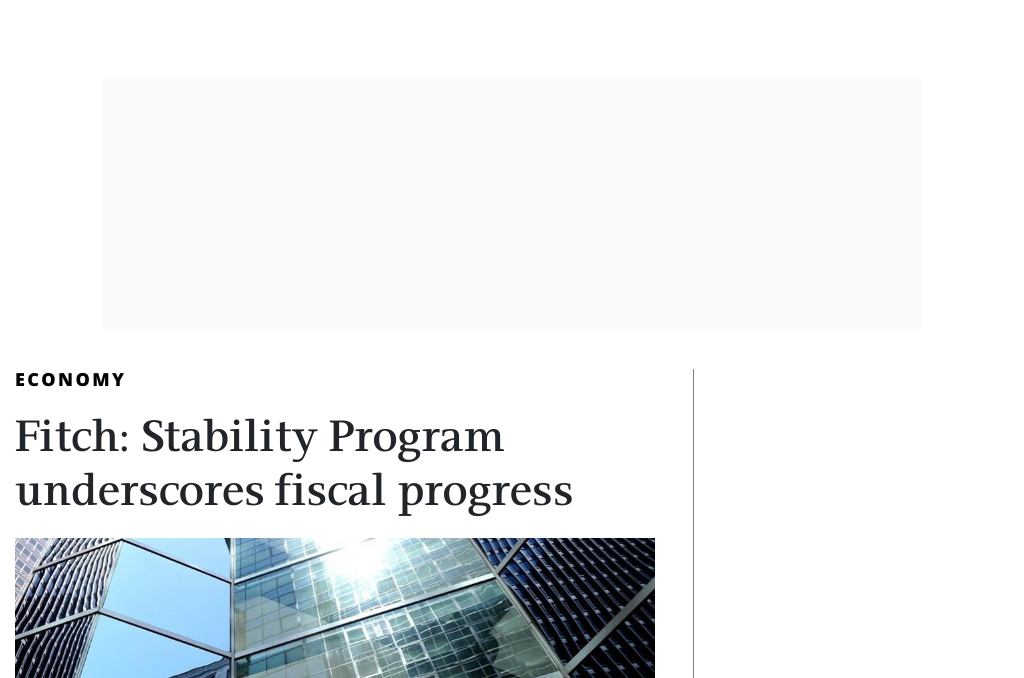Greece’s 2023 Stability Programme has received positive feedback from Fitch Ratings, which has highlighted the strong improvement in public finances and a substantial reduction in debt. Even if some of the programme’s projections proved to be optimistic, it reinforces Fitch’s view that the debt ratio will continue to fall over the medium term. The Stability Programme underscores the authorities’ commitment to fiscal prudence.[0] In 2022, Greece experienced a positive snowball effect as nominal growth remained high while average interest rate costs only slightly increased. This resulted in a significant decrease in debt-to-GDP by over 23 percentage points, reaching 171.3% of GDP. This is lower than the average of the eurozone, which is at 91.6%. Additionally, this level is below what Greece had before the pandemic.[0] Reduced primary surpluses than anticipated would not obstruct the reduction of debt.[0]
Fitch expects the debt ratio to fall more slowly over the medium term and thinks it is unlikely to go as low as 135.2% in 2026, as projected in the Stability Programme. The Stability Programme submitted to the European Commission in April projects an increase in real GDP this year of 2.3%, down from 5.9% last year but stronger than the 0.8% Fitch forecasts for the eurozone in 2023.[1] The projected headline and primary budget balances for 2023 are -1.8% and 1.1% of GDP, compared to the 2022 figures of -2.3% and 0.1%.[1] Continued economic expansion, supported by investment and higher exports, will help sustain primary surpluses, which will reach 2.5% of GDP in 2026, according to the programme.[0]
Notwithstanding this better-than-expected starting point, the new Stability Programme’s fiscal projections may prove optimistic, says Fitch.[0] This is partly because its 2.3% real GDP growth projection is largely driven by an expected increase in investment, which contributes 1.8pp to 2023’s expected growth.[0] Investment as a share of GDP is expected to rise to 15.3% in 2023, from last year’s 13.7%, assuming the effective implementation of Greece’s Recovery and Resilience Plan (RRP).[0]
Fitch’s upgrade of Greece’s sovereign rating to BB+/Stable in January reflected their expectation of better deficit and debt outturns and projections in 2022-2024, thanks to stronger nominal growth, budget underexecution, and a favourable debt-servicing structure.[1] The 2022 outturns reported in the Stability Programme were even better than Fitch’s estimates, with headline and primary balances beating expectations stated in their March Sovereign Data Comparator by more than one percentage point.[1]
The credit rating agency has praised the authorities’ commitment to fiscal prudence and the strong improvement in public finances in Greece’s 2023 Stability Programme. Even though some of the projections may prove optimistic, Fitch believes that the debt ratio will continue to fall over the medium term. Continued economic expansion, supported by investment and higher exports, will help sustain primary surpluses, which will reach 2.5% of GDP in 2026, according to the programme.[0]
0. “Greek Stability Programme underscores strong improvement in public finances, Fitch says” Hellenic News of America, 12 May. 2023, https://hellenicnews.com/greek-stability-programme-underscores-strong-improvement-in-public-finances-fitch-says
1. “Fitch: Stability Program underscores fiscal progress” Kathimerini English Edition, 13 May. 2023, https://www.ekathimerini.com/economy/1210869/fitch-stability-program-underscores-fiscal-progress
